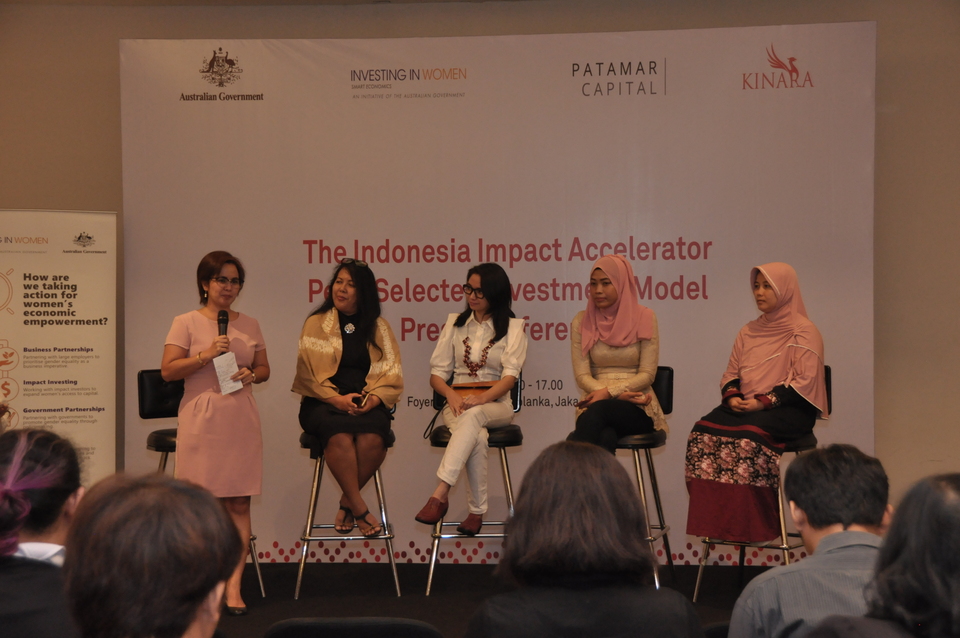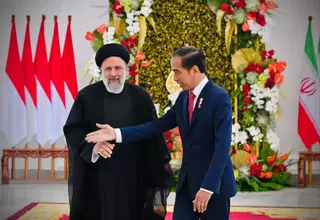Impact Accelerator Program Offers Lifeline for Female Fashion Entrepreneurs

Jakarta. Venture capital firms Kinara Indonesia and Patamar Capital have returned with the third series of their Impact Accelerator Program, providing seed investment for four female entrepreneurs in Indonesia's fashion industry.
Ethical fashion brands Astungkara Indonesia, HeyStartic, Kostoom and Minikinizz received seed investment of $25,000 each to develop their business.
The accelerator program is adopted from Village Capital’s peer selection and investment model.
The four-month program comprises workshops and webinars to improve the brands' business performance.
In the workshops, participants will learn how to refine their business model, create and manage their team, interact with customers, connect with investors and strengthen their business network.
The program is done in partnership with Investing in Women, an initiative from the Australian government. The main focus is on helping female Indonesian entrepreneurs scale up their business to become investment ready.
Tough Challenges
Ellen Nio from Patamar Capital said the program will help Indonesian female entrepreneurs to catch up with their male counterparts.
According to a recent study by the firm, women in Indonesia are still being undervalued in the business sphere, especially in the fashion industry.
"There’s a gender bias in the market. When a market is dominated by women, its value is seen as lower," Ellen said.
Indonesia's fashion industry exports garments worth $40 trillion each year. And yet, many women in the industry still experience discrimination.
"Many women in the industry work more hours for less money. They’re often considered less skillful than their male counterparts. This is why it’s difficult for them to own their own business," Ellen said.
Negative stereotypes of female entrepreneurs also stop them from earning extra capital to grow their business.
"There are more than 700 small and medium enterprises [SME] in Indonesia. Half of them are owned and led by women," Ellen said. "We want to help these SMEs become investment ready."
Why Fashion?
Indonesia is home to 2,980 garment factories, 90 percent of which are located on its most densely populated island of Java.
The country's retail sector meanwhile is dominated by around 180 foreign brands.
There are also around 3.5 million SMEs in the fashion industry, 60 percent of which are informal and undocumented.
"The fashion industry keeps growing globally," Ellen said. "Indonesia earns a revenue of $2,314 million from the industry each year."
Around 1.3 million Indonesians work in garment factories and more work from home. Around 78 percent of them are female.
Another Patamar Capital study shows women are involved at every stage of the supply chain. And yet, in Southeast Asia women working in garment factories are often paid below legal wages.
Many of these workers earn only about $120 in basic wages per month, with an overtime fee of $5 to $6 per day.
Skilled women are usually employed in small dress shops as cutters and seamstresses. Some of them work as artists and designers in boutiques or fashion labels while highly skilled and trained women are involved in material sourcing, production and marketing.
"We hope IAP can convince its participants to offer fair compensation, reduce poverty, minimize destruction of the environment and maximize benefits for everyone in the supply chain," Ellen said.
Investing in Women
Investing in Women (IIW) is an initiative from the Australian government done in partnership with the governments of the Philippines, Vietnam, Indonesia and Myanmar.
"Our goal is to accelerate women’s economic empowerment in the region and to contribute to inclusive economic growth in Southeast Asia," said the program's partnership manager Marie Torres.
The program helps female entrepreneurs to form partnerships with employers to promote gender equality. It also helps them to find impact investors to improve women's access to capital.
Its partnerships with governments are intended to promote gender equality to policy makers and challenge biases, stereotypes and attitudes that hold women back in the business sphere.
"We believe in the skills and talents of women," Torres said.
Meet the Entrepreneurs
Ellen said Patamar Capital has selected brands that can make real changes in society for the accelerator program this year.
Catching on the green fashion trend, IAP selectors had encouraged "slow fashion" brands to apply for the program.
The first selection round ended up with 12 female "ethical fashion" entrepreneurs. After a peer review, the number was cut down to four. Here they are:
a. Astungkara
Established in 2015, Astungkara Indonesia specializes in production, marketing and consultancy services for fashion brand owners.
The Bali-based company connects business owners and fashion designers with artisans, organize training to improve their skills and perform quality control.
"Products that Astungkara Indonesia had their hands on are made to international standards and have been exported to Europe," Astungkara's founder Agnes Savitri said.
Katy Perry, Justin Bieber and Rihanna are said to have worn Astungkara products.
b. Minikinizz
Who knew reusable diapers can be part of fashion? Minikinizz is a small Jakarta brand specializing in making environmentally-friendly custom baby clothes.
Minikinizz aims to reduce inorganic waste by producing reusable cloth diapers, training pants and swim diapers.
c. Kostoom
Kostoom is an online on-demand tailoring service that finds jobs for tailors who work from home or small shops.
Kostoom's owner Putri Yuli said she created the brand after seeing the sorry state of many small tailors in Jakarta.
"Most local dressmakers have no budget, no marketing and very rudimentary sewing machines. These mostly home-based tailors earn very little money, though the quality of their work is excellent," Putri said.
The Depok-based startup currently has 170 dressmakers registered on its platform and hopes to have more than 2000 dressmakers by the end of this year.
d. HeyStartic
HeyStartic produces clothes and accessories made from recycled materials and is one of an increasing number of ethical brands making a name for themselves in the green fashion scene.
Having started the brand as a social project, founder Vania Santoso said HeyStartic now concentrates on making upcycled fashion products and promoting a green lifestyle.
Their best-selling product is a waterproof artificial leather made from upcycled cement sacks. The material has been a hit with young professionals.
The brand also employs artisans handpicked from underprivileged communities to make products for the brand and to become trainers for its public workshop.
"Hopefully IAP can help me help more local artisans," Vania said.
Tags: Keywords:POPULAR READS
Apple Wants to Increase Investments in Vietnam
Vietnam has become more important to Apple as the company seeks to diversify its supply chains away from China.China’s Top Diplomat Wang Yi to Visit Indonesia for Cooperation Talks
Chinese top diplomat Wang Yi will chair a policy coordination meeting aimed at strengthening Indonesia-China cooperation.President Jokowi Urges Global Restraint as Tensions Rise in the Middle East
President Joko "Jokowi" Widodo emphasized the importance of diplomatic efforts to prevent the escalation of conflict in the Middle EastKPK Identifies Sidoarjo Regent as Suspect in Corruption Probe
KPK has identified Ahmad Muhdlor Ali as a suspect in a corruption case involving the Sidoarjo Regional Tax Service AgencyEconomic Concerns Overshadow Security Worries for Indonesians in Iran
Indonesian citizens currently in Iran are more concerned about rising inflation than the security situation in the country.Popular Tag
Most Popular






















